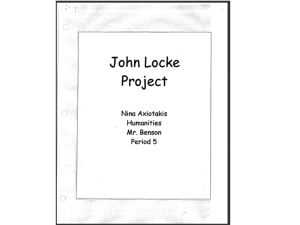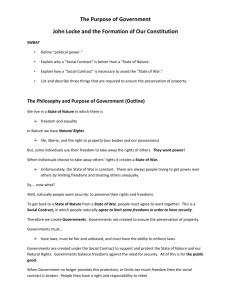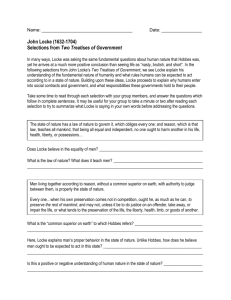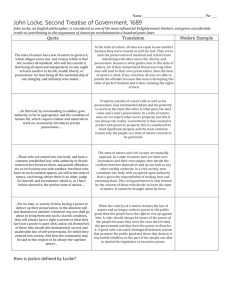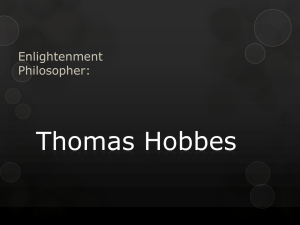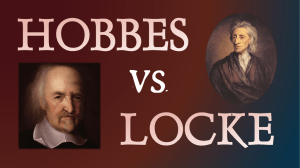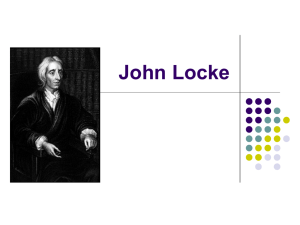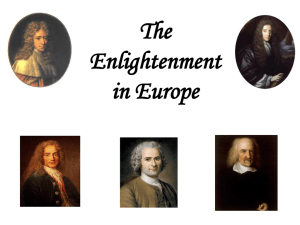Notes
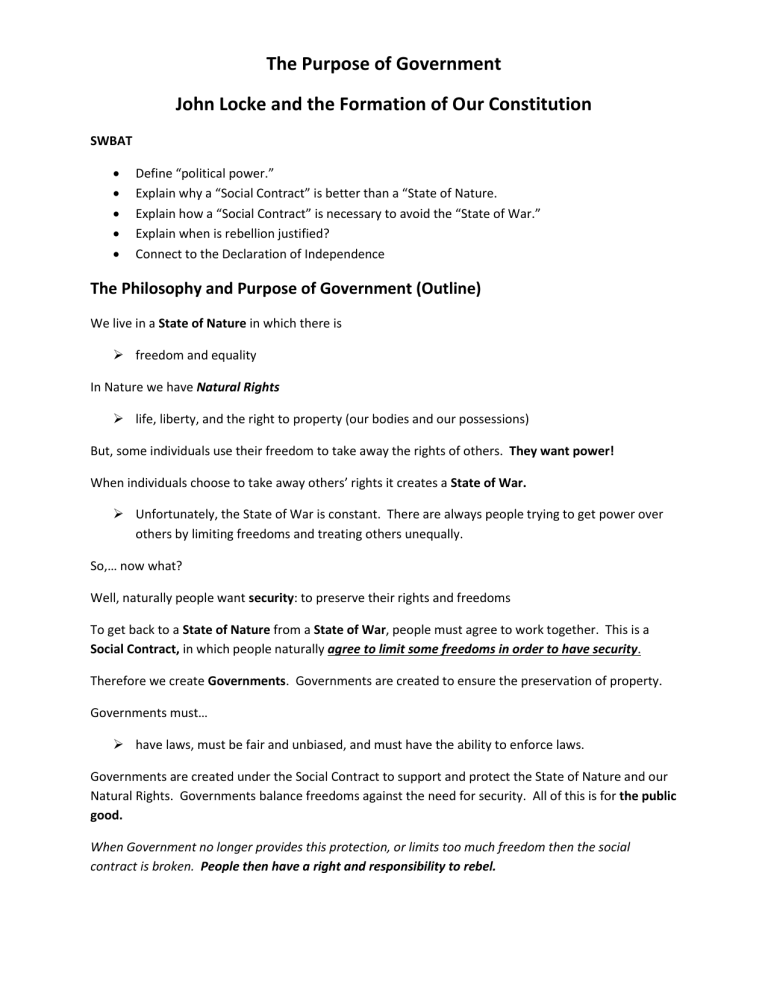
The Purpose of Government
John Locke and the Formation of Our Constitution
SWBAT
Define “political power.”
Explain why a “Social Contract” is better than a “State of Nature.
Explain how a “Social Contract” is necessary to avoid the “State of War.”
Explain when is rebellion justified?
Connect to the Declaration of Independence
The Philosophy and Purpose of Government (Outline)
We live in a State of Nature in which there is
freedom and equality
In Nature we have Natural Rights
life, liberty, and the right to property (our bodies and our possessions)
But, some individuals use their freedom to take away the rights of others. They want power!
When individuals choose to take away others’ rights it creates a State of War.
Unfortunately, the State of War is constant. There are always people trying to get power over others by limiting freedoms and treating others unequally.
So,… now what?
Well, naturally people want security: to preserve their rights and freedoms
To get back to a State of Nature from a State of War, people must agree to work together. This is a
Social Contract, in which people naturally agree to limit some freedoms in order to have security.
Therefore we create Governments. Governments are created to ensure the preservation of property.
Governments must…
have laws, must be fair and unbiased, and must have the ability to enforce laws.
Governments are created under the Social Contract to support and protect the State of Nature and our
Natural Rights. Governments balance freedoms against the need for security. All of this is for the public good.
When Government no longer provides this protection, or limits too much freedom then the social contract is broken. People then have a right and responsibility to rebel.
Hobbes: a Philosopher/Writer
• Wrote Leviathan 1651 ( Leviathan: a large beast or powerful organism)
• He introduced the State of Nature
• He believed all had the right to
– Do everything and anything.
– Self-preservation through self-defense.
• This naturally brought man into war.
• War is not in man’s best interest
• The only way out of war, is by entering into a social contract under an authority who will provide safety and order.
The “Leviathan” was the Monarch (king) – he has absolute power
• Hobbes believed: The ruling, protective authority had complete power even in matters of religion and thought/belief.
• There is no separation of powers (no sharing of power).
• The Leviathan (Monarch) was the Lawmaker, the Judge, and the Executioner – he did everything.
• Who was in authority over the Leviathan / Monarch? = God?
18 th Century Philosophy – Thinkers of the time…
• Put an emphasis on reason and logic
• believed that Social Progress = people friendly politics (politics focused on helping people)
• John Locke was a political philosopher
– He believed that if Natural Laws were logical and could be “discovered” then so should there be discoverable political / social laws. An example of one natural physical law is the Law of Gravity. He also believed in Laws that rule social interaction.
Locke believe there were Natural Rights
• All men possess or are “granted” these by the Creator (“among these are . . .”)
Life, Liberty, Property (the right to own)
• Problem: the study of history shows these rights have often been denied (not given)
Locke also believed in these States:
State of Nature: NEVER LASTS = a period of freedom and equality.
State of War: PERSISTS INDEFINITELY (forever): “There are always bullies that threaten the weak.”
State of Political Power: try to create a Civil Society: supported by a Social Contract (laws)
Let’s Look at John Locke’s Second treatise of Government…
State of Political Power (summary)
• Locke says that Governments are authorized to make rules and penalties, even severe ones,
• to ensure protection of property,
• Governments are also authorized to use the force of the community to enforce these rules
– and protect groups from other groups;
• All this for the good of the group.
State of Nature
• Locke believes all people live in a State of Nature where everyone is free and equal
• What two words describe and characterize the State of Nature?
Answer: FREEDOM
Answer: EQUALITY
More State of Nature
• A state of Freedom and Equality
• we live by Natural Laws
• Everyone has Equal power and jurisdiction (responsibility) to enforce laws which Locke calls infringements on Freedom & Equality
• How? People enforce laws by forcing others to follow them through fear of punishment and threat of death
Questions
• Do we live in a State of Nature?
• Do we have full Freedom and Equality?
• What would be another word for this state? Why?
State of War
• Once one man attempts to place another under his absolute power he puts himself into a State
of War with others.
• War is the state of Enmity (disrespect) and Destruction!
• The transgressor (the person trying to take absolute power) has left “reason” and become a
“wolf.” He has chosen to take away others’ rights to freedom and equality.
How about a Society?
• Individuals consent (agree) to become a civil society or community = social contract
• In a community people create a Government. Political Power is given over to selected members of the group (leaders)
• Under the Social Contract there is a constant balancing of Natural Rights vs. Security
• Why? To preserve and protect Natural Rights, such as…
• Life, Liberty, Preservation of Property
State of Political power:
• Governments are authorized (given permission) to make laws and penalties,
• to ensure preservation of property,
• and use the force of the community to enforce these rules
– and protect from other groups;
• All of this is for the public good.
REBELLION!!
• When is rebellion against the standing government permitted?
• Refer to the opening paragraphs of the Declaration of Independence.
Locke Study Guide (go back and find answers in your notes)
• What three “states” does Locke describe?
– Place them in order:
• What are our three Natural Rights?
• What do individuals hope to gain by giving up certain freedoms?
– Give an example of a freedom given up to gain a benefit.
• Under what conditions is can individuals rebel against an established authority (government)?
• Define the following terms:
– State of Nature: __________________________________________________________
– State of War: ____________________________________________________________
– State of Political Power: ____________________________________________________
– Social Contract: ___________________________________________________________
• Why do individuals try to create “social contracts?”
